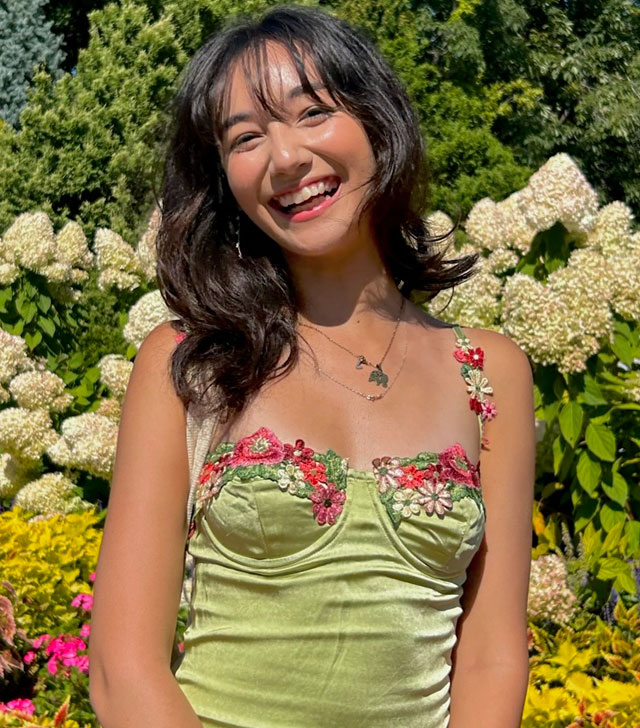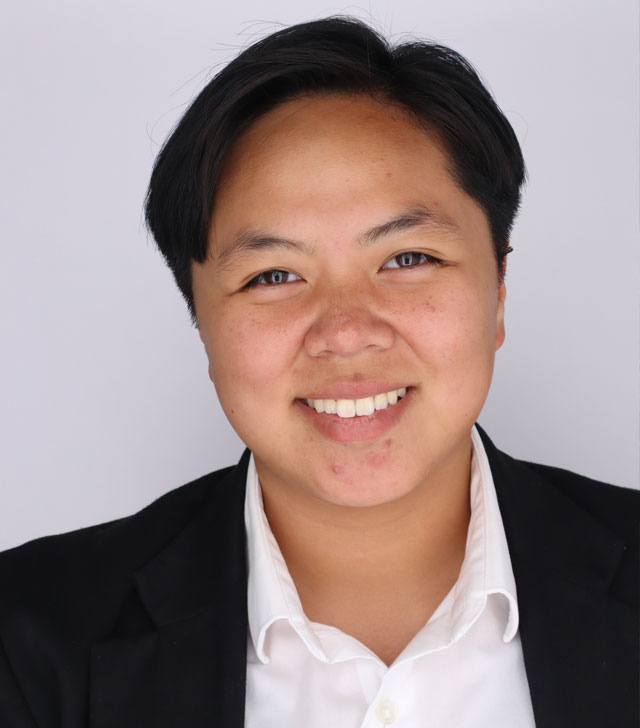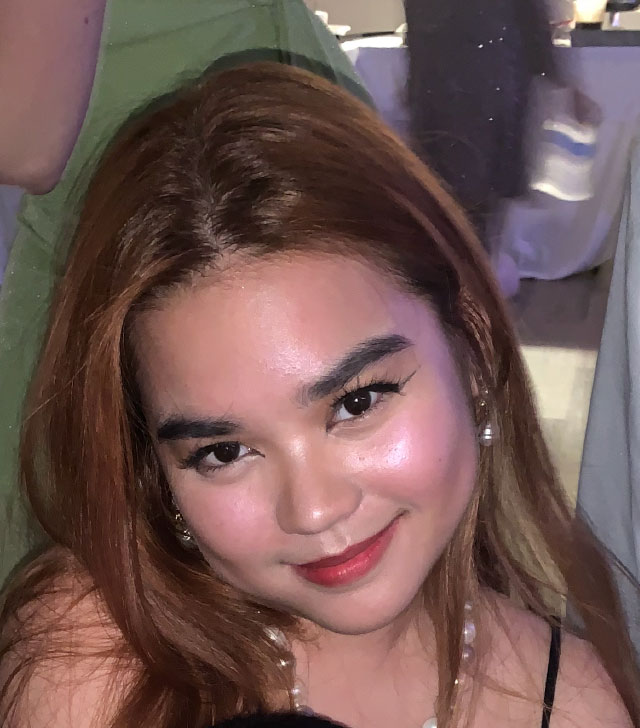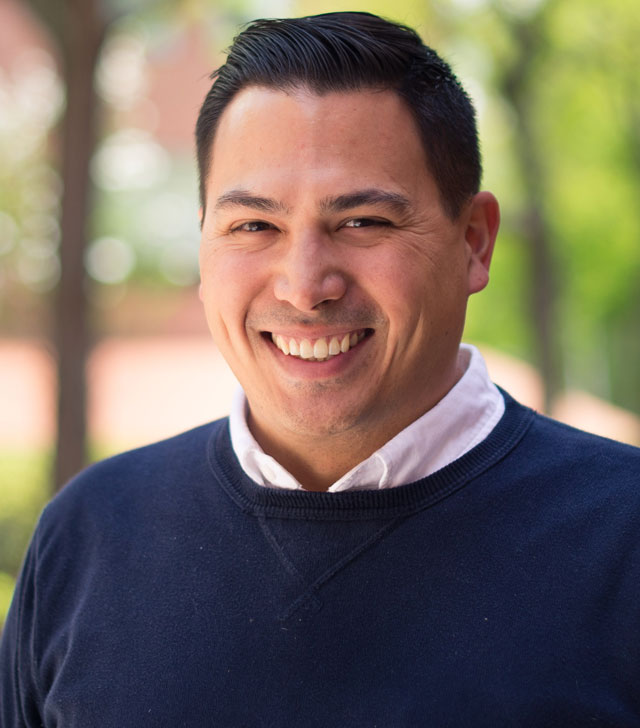From studying social work, geological sciences, and neuroscience, to pursuing optometry, to working at the law school, those of Filipino heritage are engaged with countless facets of the university.
In recognition of Filipino American History Month, which takes place each year in October, The Daily is celebrating the accomplishments and experiences of four of those Filipino members of the CWRU community. Discover more about their experiences at Case Western Reserve—and learn how their heritage has impacted their lives.
Answers have been lightly edited for clarity and length.
Gabrielle Cuntapay

Second-year, geological sciences major, pre-optometry track
Gabrielle Cuntapay’s story is one of connection—to her roots, to the Earth, and to the community she’s found at Case Western Reserve University. Though she wasn’t born in the Philippines and has yet to visit, she deeply appreciates and connects with Filipino culture in many ways.
“My pamilya (family) regularly comes together for gatherings, where we enjoy traditional Filipino dishes like Kare-Kare, Adobo, and Sinigang,” Cuntapay explained. “We celebrate our heritage through dances like tinikling and, of course, by singing karaoke. On special occasions, such as Filipino weddings, we proudly wear traditional attire, embracing the customs passed down through generations.”
To her, Filipino American History Month is a time of celebration to honor Filipino history and reflect on how her culture has evolved and thrived.
“It’s a moment to appreciate the beauty of our homeland and enjoy treats like halo-halo that satisfy our sweet tooth,” she added. “Above all, it’s a month dedicated to sharing and spreading awareness of our rich culture.”
Read on to learn more about Cuntapay.
1. Where is your family from/where did you grow up?
My father is from Manila, Philippines, and my mother is from New Orleans, Louisiana. Though I’ve lived in various places across the country, I consider New Orleans my home. My father and his family moved to the U.S. when he was in second grade and spent most of their lives in Louisiana. On my mother’s side, her family has Scottish roots but has lived in Louisiana for decades.
2. Why did you choose to study at CWRU?
I chose CWRU through the Posse Foundation Full-Tuition Leadership Scholarship. As a Posse scholar, our mission is to become leaders and inspire leadership globally. I was drawn to CWRU to represent the school well and make a meaningful impact on campus.
3. Why did you choose to study geological sciences and optometry?
I’ve always appreciated how Earth cares for us, constantly healing itself despite the damage humans cause. I want to deepen my understanding of its structure to help reduce environmental pollution and combat climate change. My goal is to help others see and appreciate Earth’s beauty, which is why I plan to pursue a career in optometry. Many people neglect regular eye exams, which can affect how they view the world later in life. I aspire to be an eye doctor who ensures my patients see the world and all its beauty with 20/20 vision.
Eddie Encarnacion

Master of Social Work student
Eddie Encarnacion grew up in a large Filipino community in Toledo, Ohio, where cultural traditions and family played a central role in their life. From sharing meals to participating in community events, these experiences fostered a strong sense of belonging and shaped Encarnacion’s understanding of the importance of support and connection among people.
“Being exposed to American culture at school while growing up with Filipino culture at home was difficult at times,” Encarnacion said, “but something that helped strengthen my connection to my Filipino culture is the big community we had surrounding us.”
To Encarnacion, this month is a reminder to appreciate the sacrifices that their parents, grandparents and relatives made for them, their siblings, their cousins and those who come after them.
“It is a reminder to embrace the uniqueness that comes with being Filipino American,” Encarnacion said. “It is a reminder to be proud of what we have accomplished and how diverse we are, and to stay strong for what needs to be accomplished. Filipino American History Month is a celebration of strength and resilience.”
Read on to learn more about Encarnacion.
1. What are some important aspects about your culture?
The center of most Filipinos’ social life is their family, and Filipinos are also very artistic and creative. Food is one of the most important ways we show our love and care to others. When a guest walks into our house, one of the first things we offer is food. When a guest leaves the house, most likely, we offer food for them to bring home. I am blessed to have Filipino recipes passed down by my elders.
2. Why did you choose to study social work?
“Children are our world’s most vulnerable population, but they are also our future leaders.” That’s what I always tell people when I am asked why I chose social work. It summarizes all of the moments that have led my heart to social work and why I am passionate about it. There were multiple defining moments that shaped me and contributed to my decision to pursue social work—people I’ve met, their stories, and my story. One of the moments I had that had fully committed me to social work was knowing that my heart would not be satisfied if I had pursued any other profession. I want to provide a safe and loving environment—a home—for those who do not feel safe or loved in their home, and I know that when time passes, these children will be leading our country.
3. What do you think the campus community should know about Filipino heritage in general?
The Philippines is a low-income country, yet there are many generally happy Filipinos. How can a country that has so little feel blessed by so much? They are resourceful. They make something out of nothing, both in their basic needs and in life-fulfilling experiences. And when us Filipinos are passionate about something, we try to put our entire hearts into it.
Renee Gale Lapurga

Second-year, neuroscience major
Born in Manila City, Philippines—a bustling city that mirrors the vibrancy of New York City—Renee Gale Lapurga moved to the U.S. in sixth grade, carrying with her the rich traditions of her homeland.
For Lapurga, Filipino American History Month is more than just celebrating those traditions; it’s an acknowledgment of the deep roots that Fil-Ams have planted in American history—and a time to nurture and keep that history alive for generations to come.
“Filipino American History Month acknowledges the impact and contribution of Filipino Americans to the culture and history of the United States,” she said. “Fil-Ams were the first Asians to step foot in the Americas, specifically in Morro Bay, California, on Oct. 18, 1587. The Manilamen helped connect the economies of Asia, the Americas, and Europe through the Manila galleon trade.”
Read on to discover more about Lapurga.
1. Why did you choose to study at CWRU?
CWRU offers high education standards, world-class research, a collaborative environment, state-of-the-art facilities, and rich cultural diversity in the heart of Cleveland. The endless opportunities and countless resources entice my thirst for knowledge. Furthermore, its multicultural environment fosters acceptance, camaraderie, and tolerance among students. This makes us flexible and adaptable to change and encourages unity, which is why I chose to attend CWRU.
2. Why did you choose to study neuroscience?
Growing up, I was always curious about how people—or animals—interact and interpret stimuli differently, even though they are the same. When I was introduced to the brain in AP psychology, it interested me and, eventually, spurred me to major in neuroscience.
3. What do you think the campus community should know about Filipino heritage in general?
Filipino heritage is multi-faceted. Its rich culture and tradition are not surface-level—they are deep-rooted, it’s more than meets the eye.
Andrew Geronimo

Director, First Amendment Law Clinic at the School of Law
Andrew Geronimo was born in Toledo, Ohio, and raised in Shaker Heights, where his Filipino heritage has profoundly influenced his life and values. With a father who immigrated from the Philippines in the 1950s, Geronimo grew up surrounded by a culture centered on faith, family and community.
These principles, along with a strong work ethic, have shaped his upbringing and continue to inform his approach as the director of the First Amendment Clinic at the School of Law, where he fosters a deep appreciation for the importance of free speech and the diverse narratives that shape American society.
“Filipino American History Month reminds me of the hard work and sacrifices that led my family to the United States,” Geronimo said, “and the contributions to society that immigrants bring to this country.”
Read on to learn more about Geronimo.
1. Tell us about your family heritage?
I am half Filipino; my father immigrated to the United States with his parents and siblings from the Philippines in the 1950s. My paternal grandfather was from the Manila area (Hulo) and my maternal grandmother was from Tacloban in Leyte.
2. Tell us about your role at CWRU.
I am the director of the First Amendment Clinic at the School of Law, where my colleagues and I work with law students representing clients in civil litigation matters that advance free speech. Because the First Amendment is uniquely American, we often discuss how our matters might be different in countries without similar constitutional protections.
3. What do you think the campus community should know about Filipino heritage in general?
I’ve encountered a lot of misunderstandings about my heritage and my Filipino culture. In my experience, there is a lot of diversity among Asian cultures generally and even within the Filipino community. My experience of Filipino culture is one that values community, togetherness, and embracing people no matter their culture.

